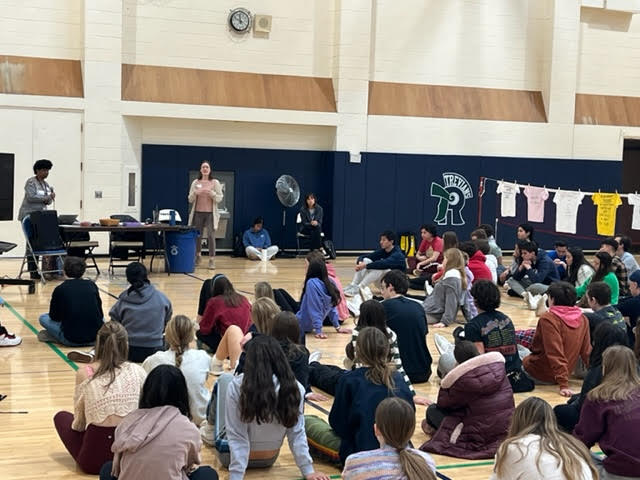Wellness week addressed sexual violence
The event empowered survivors to speak up, and for students to listen
Butler
Hannah Gunter from the Evanston YWCA presented the Clothesline Project for Kate Goodman’s and Pete Drevline’s 5th period KW classes.
On April 25-29, Wellness Week adopted the theme of “Empower” for the first time in its history. This focus entailed presentations and discussions on healthy relationships, consent, sexual assault prevention, and healing.
The student action group New Trier Students Demand Change, led by junior Owen Levens and senior Bella Nash, met with the Kinetic Wellness Department Chair Andy Butler to enrich this year’s Wellness Week program. One of the most impactful programs was a presentation done by Liv Harmening from Northwest Center Against Sexual Assault (Northwest CASA).
“Northwest CASA was doing a program with all the yoga classes throughout the week. Northwest CASA really wanted to do something that was not just a short presentation, but something a little more authentic and in depth. So that’s why they were with the yoga classes for the entire week,” said Butler.
Harmening’s presentation used an interactive database called Menti.com where she and the students could engage in meaningful discussions about healthy relationships. What made Harmening’s presentation stand out was her take on abusive relationships. She acknowledged that relationships don’t necessarily have to be violent to be abusive.
Junior Sam Schmidt said that understanding this crucial concept is especially important for juniors and seniors who are beginning to pursue, or are already engaged in, romantic relationships.
“A lot of high schoolers are in relationships, and a lot of adults are also in relationships. But we high schoolers are doing something that adults do without the knowledge and the experience that comes with it,” he said. “So, it’s good to know what I should be doing for my relationship if I have one.”
While healthy relationships are important, Wellness Week made a point of focusing on sexual assault. One of the more popular programs that highlighted this issue was the Clothesline Project.
The Clothesline Project is a nationwide project where survivors of violence, or those who have lost someone to violence, make colorful shirts to break the silence of their experiences. This year’s Clothesline Project was sponsored by YWCA for the first time.
In G108, the exhibit showcased different colored shirts from high schools around the area including Glenbrook, Evanston, and Deerfield. Fit Female teacher Kate Kalnes explained that each color is used to represent a different form of violence.
“A lot of times, I think we kind of push it off and say these acts don’t happen here. We think this is happening in other places. But this is a way for students to realize that this is happening here. This is happening to our peers,” she said.
This mindset is what helped form the New Trier Students Demand Change last Spring. They hosted weekly meetings with coordinators of the Kinetic Wellness Department and Paul Sally to discuss how to bring immediate awareness among students.
According to the heads of New Trier Students Demand Change, the group organized a walkout on Dec. 9 in protest against a sexual assault case.
While the walkout was not able to happen, New Trier Students Demand Change persisted in finding other ways to bring clarity to sexual violence, such as leading the Rape Aggression Defense (RAD), a newly required program for freshman girls to learn self-defense skills. Immediately after, they took on a separate project with Wellness Week.
According to Butler, Wellness Week proved to be effective in raising awareness for students. While the school might be one of the topmost in the nation, it is still just as vulnerable to acts of violence.
“Wellness Week was able to confirm that sexual assault doesn’t discriminate about location, community, or person,” said Butler. “So, it is really important for us to talk about it, have healthy conversations, and educate our students about what’s going on, how to protect yourself, and how to find support if you need it.”









































